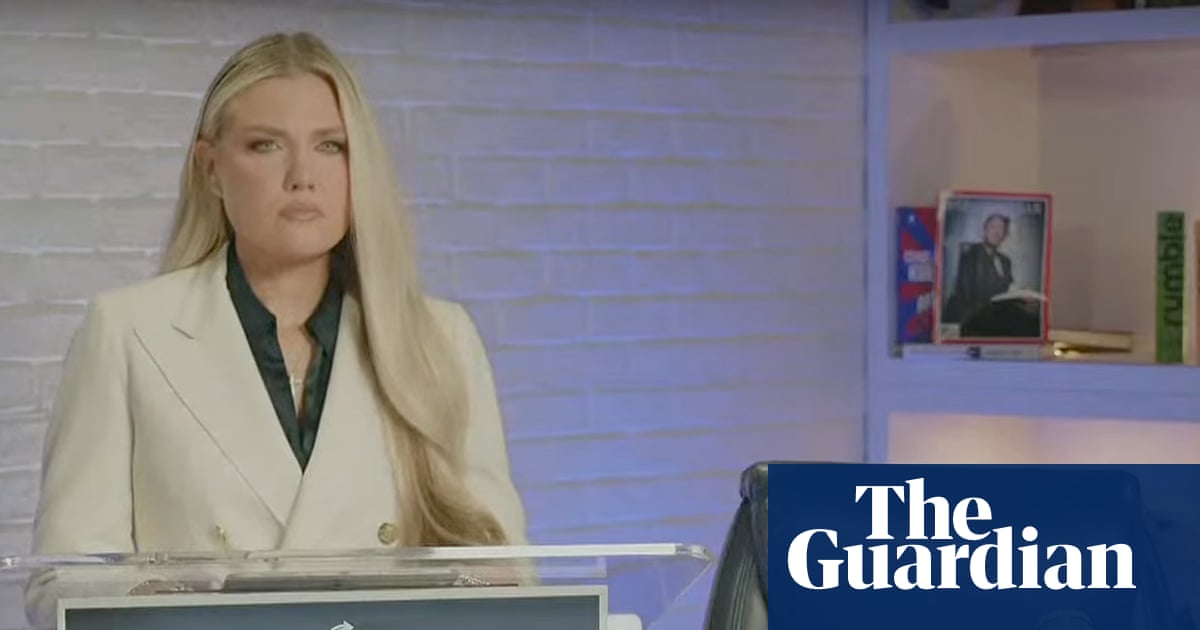By all accounts, Sabrina Carpenter is in control.
The 26-year-old singer, who signed a record deal with Disney at 12 and became a star in her teens, worked through 10 years and five albums before Espresso, a cheeky and dementedly catchy single from her album Short n’ Sweet, became the song of summer 2024. She writes or co-writes all of her songs with a signature imprint – saucy, clever, unabashedly horny and in on the joke of being both attracted to and disappointed by men. (“Did you say you’re finished? Didn’t know we started,” she teases in new single Manchild.) A recent Rolling Stone cover profile espoused her intelligence, craftiness and deadpan humor. (Asked which famous ex Manchild is about, she answered, “It’s about your dad.”) She’s taking the now-unusual step of releasing a new album only a year after her breakout for no more reason than she has ideas, feels creative, and wants to – “my brain is sharp, let’s write”, she told Rolling Stone.
But though Carpenter is evidently in the driver’s seat, the music video for Manchild finds her as a passenger, eye-rolling at a series of incompetent men on a surreal hitchhiking jaunt through the desert. Besides humorously imagining the manchild’s shortcomings as vehicles, poking fun at some traditional movie pinups and relishing enjoyably strange images, the video continues Carpenter’s star-making playfulness with the idea of being a sexy, submissive vixen, Betty Boop for gen Z. The single came accompanied by cover art for her upcoming album, Man’s Best Friend, in which the pint-sized Carpenter, clad in a black minidress, appears on her knees, pawing for the attention of an anonymous man in a suit, his hand loosely gripping her blonde bombshell hair.
Unsurprisingly, the internet hasn’t reacted well. Carpenter, a sharp student of pop music, is clearly working in the Madonna tradition of sexual provocation for provocation’s sake, poking fun at tropes and people’s prudishness with an alluring frankness. But online, one would have you believe that she’s set back the cause of feminism by a good 10 years. On Reddit, on her Instagram, on the dregs of the rightwing rage-bait website formerly known as Twitter, users – overwhelmingly women – have accused Carpenter of caving to the male gaze, promoting regressive attitudes, not understanding satire and even threatening women’s safety at large. “Insanely misogynistic imagery”, wrote one Instagram user, echoing the sentiments of the entire r/popculture subreddit. “Sabrina this is not the slay you think it is …” wrote another.
On TikTok, the image has folded easily into one-woman explainers on how the cover is actually the opposite of empowering, or how the furore encapsulates the context-less, ahistorical, flattened discourse that is everything wrong with modern society, etc. (For what it’s worth, there’s also a semi-convincing theory that Carpenter will eventually reveal a larger image in which she also plays the man in the suit.) A women’s aid group for victims of domestic abuse in Glasgow went as far as calling it, absurdly, “a throwback to tired tropes that reduce women to pets, props, and possessions and promote an element of violence and control”.
In short, the discomfort is palpable, if predictable. Though female sexuality is de rigueur in pop music, we are still not used to seeing pop stars in control of their own sexuality, let alone framing themselves as the submissive. Carpenter on all fours rubs against the prevailing rhetoric of female sexual empowerment – “be on top”, “have sex like a man”, “call the shots”. Fuck, not be fucked. Dominance as the only acceptable mode, submission for sexual pleasure as inherent weakness. To be submissive and strong at once is to break some brains, the idiosyncrasies and confidence of one woman’s sexual performance inflaming the chronic poster’s allergy to fun, as well as the internet’s incentive for black-and-white thinking.
Allow Instagram content?
This article includes content provided by Instagram. We ask for your permission before anything is loaded, as they may be using cookies and other technologies. To view this content, click 'Allow and continue'.
Carpenter, unapologetically girly and often bedecked in lace lingerie, knows exactly what she’s doing. With only an album cover and one song to go by, it’s still too soon to see the full scope of her tongue-in-cheek satire, but the outline of riffing and reclaiming male fantasies is clear. The Rolling Stone shoot – floral, pastoral, fairy-esque – invokes the imagery of tradwives, the third rail of female empowerment discourse online. Such women sell a fantasy of chicken eggs, meals from scratch, barefoot and pregnant and always in service of the man. They also sell sex, albeit quietly, as baby-making machines for the head of the family. Carpenter in gingham lingerie, posing with a deer in the woods surrounded by flowers, makes the subtext literal: this is a male fantasy for men who do not like women’s independence, and she is owning it.
The thing missing from all this commentary is a sense of fun, which Carpenter appears to be having in spades. Like Addison Rae, a fellow recent breakout who frequently performs in a bra and underwear, Carpenter’s pop performance relishes the messiness, sexual exploration and growth of one’s mid-20s via refreshingly catchy tunes. Rae’s brown-eyed, Louisiana girl-next-door perkiness, athletic dancing and pure pop instincts recall a young Britney Spears – except, crucially, she is 24, and has been pursuing mega-fame on her own terms for years on TikTok. Both she and Carpenter exist at the young adult nexus of self-awareness and youthful abandon, their frank sexuality both cheeky and serious.
It’s worth noting that how Carpenter and Rae’s look influences the conversation. Both are conventionally gorgeous, styled as pinups but not busty, obviously Hollywood but still seemingly natural. The Man’s Best Friend image would read differently if Carpenter adhered more to the prevailing trends of body modification. If, in other words, she looked like a Kardashian, transforming her body and looks into a male-brained ideal of a female cyborg. With each passing day, I am personally less and less interested in perceived artistic “authenticity” – supposedly confessional lyrics, lore, celebrities pandering that they’re just like you – and more and more drawn in by authenticity of form, real or perceived. In a sea of snatched faces, plumped lips and freakishly hourglass bodies, it feels refreshing to see pop stars who are still idealized but within normal human proportions. When it comes to the amorphous cause of women, I’m much more concerned with the paradigm shift toward celebrities flaunting their plastic surgery – human bodies metamorphosed through procedures and substances at exorbitant cost, like the Pygmalion myth in reverse – than Carpenter on her knees.
But she’d probably say I’m overthinking it. This is pop music, after all – sex sells, and whether people are buying her shtick or not, we’re still talking about her album.

 2 months ago
48
2 months ago
48

















































